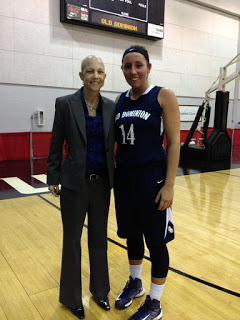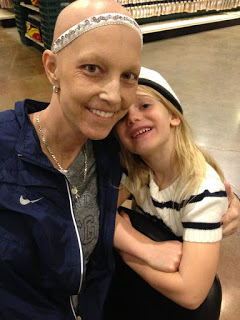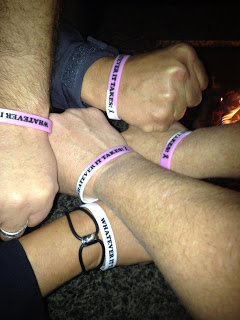 |
| Sara with ODU’s Jackie Cook |
The doctor didn’t believe that the cancer had come back.
“For that to be so,” he explained to Sara Jones, “it would have to have eaten through the bone.”
Somehow, it did.
For the third time, Sara Jones had cancer. For the third time Sara Jones, 40 years old, has cancer. Metastatic cancer, and metastatic — the cancer has spread to other parts of the body — is one of those words — malignant, chemotherapy, tumor — that it hurts to say. Especially when you think you’ve beaten cancer not once, but twice. Remember, you weren’t supposed to even have it in the first place. That’s what the doctor said not once, but twice.
The first time when you felt the pea-sized bump under your left breast, you didn’t worry. You believed him.
After all, you were 28 years old, a firefighter, a gym rat training to compete as a body builder.
“I was in the best shape of my life,” says Jones, today a volunteer assistant coach to Old Dominion head coach Karen Barefoot.
The doc says it could be fibroadenoma. Cool. No worries. You go about your business. Even the second time when you go back to the doc when you feel a bigger bump under your armpit you’re told it could be just a side effect of birth control and you shrug, “OK.” You return to your life — you keep working out, keep fighting fires, living life at your pace until a few months later, that bump is now the size of an egg.
You’re Sara Jones — former high school basketball star of a 1A team in Fort Lauderdale that tore through the state your senior year. Oh, how you relished defeating the 4A state champs with ease! Now after months of telling no one about this nothing lump, these nothing lumps, as after all this was supposed to be no big deal, you have to call your family and say this sentence.
“I have breast cancer.”
You plan to have the surgery the doctors set up for you, and then, just four days prior, you attend a women’s health conference with a friend. You hear things you didn’t expect to hear, techniques and technology that you didn’t know about, are described. You walk out and do this.
“I canceled my surgery and fired my doctors,” Jones says.
You start over with new doctors who you feel are better equipped to handle your illness. You start chemotherapy on Halloween — now you’re 29 — and by mid-January, they tell you you’re ready for surgery.
“Bilateral mastectomy with reconstruction,” Jones says, before using another term that doesn’t roll easily off the tongue, either: lymph-dissection.
“It’s like slicing raisin bread,” she says. “You don’t know how many raisins you’re going to get in each slice, so they take a slice and then they have a good sampling of lymph nodes to test.”
Some are positive. Not good. More chemo. And then you’re done — after the reconstructive surgeries.
“I’ve probably had 20 of those,” Jones says.
20.
But a year and a half later, you’re feeling pretty good. You’re back at Fire Station No. 2 in Norfolk. You love the guys. They call you Jonesy. You fight major fires you call ass-rippers, and laugh, joke, talk at the fire station, a home away from home. If you’re Sara Jones, you’ve always known your place is service, so lying down your life for another isn’t even an afterthought. It’s physically demanding work, but you love it. You’re back to being in great shape. It’s almost five years to the day that cancer entered your life — you know, that five-year milestone that signifies maybe you’ve beaten this thing.
Only you haven’t. The doctor finds a lump during a breast exam. But you don’t have breasts, you thought. Doesn’t matter. The cancer is in the scar tissue. And it’s back with such a vengeance that you don’t consider local options. You remember what your doctor said. If it returns, seek treatment out of state. You’re lucky that your doctor has ties to get you an appointment in a place considered the premier cancer hospital in the world: M.D. Anderson in Houston. It’s respected and expensive.
It’s also your life.
Jones goes to Houston.
“It was Friday at 8 a.m.,” she says. “I took the redeye. What was supposed to be an hour consult was a day’s worth of tests.”
There you meet oncologists, surgeons, specialists of every nature sitting with you in the room — all in a round table talking about your plan. You hear a lot. You remember one line, in particular.
“If you want to be here in five years, you’ll be here in five weeks.”
It is 2005. You pack up and rent an apartment in Houston, home for the next four months. You get radiation, excruciatingly painful burning heat that produces third-degree burns on your skin. Every day you lay in a mold; every day the skin rips open in that same painful spot, allowing the radiation to focus on isolated parts of your body. You compare it to having a paper cut in the worst possible place.
The surgery that follows takes all the tissue down to your ribs. They got it all, they tell you, and you go home, back to the fire department. Back to Curves to work out. Back to pickup basketball with Barefoot. Back to friends and family.
Life is good again for Sara Jones.
That five-year mark nears again, but before you can reach it, you feel a pop in your back while in the passenger seat of your sister’s car — a pain so sharp that you know. You’re sure.
“My cancer is back.”
“Sara, it would have to eat through your bones for you to have it.”
It ate through the bones.
The word for what they do next is kyphohplasty — using a balloon, to facilitate cement injected in your spine to hold it together. That’s followed by more radiation.
The cancer is everywhere. It’s in your hips. Your legs. Your liver. Your chest. Your brain.
Your bones.
That word — metastatic.
The average is one to five years that people live with metastatic cancer.
It’s March 2010. “That’s not me,” Jones tells her doctor.
You have brain radiation for three weeks, “the worst thing I’ve ever been through,” is your description You wince at the memory — the sores in her mouth, the bleeding.
Your memory isn’t what it was. Your coordination slows. And yet …. And yet, you’re still Sara Jones.
 |
| Sara and “her heart,” niece Landon |
You’re Sara Jones, sitting in a restaurant, smiling over a bowl of pasta and a Greek salad. You’re Sara Jones who just got off the Lady Monarch bench, where you stood up, frowned and stomped a high-heeled foot; I mean, really, was that a foul? You’re Sara Jones, who just ribbed Mairi Buchan by calling her “Mairi Buckets.” You’re Sara Jones, who greets two middle school girls like best friends. What color beats did you get for Christmas?
“I feel good,” she says.
You say that although you just got back from a Vegas trip with the Lady Monarchs that sidelined you in the hospital where they pumped fluid out of your lungs for days. The pills you take outnumber your age; the narcotics cause nausea. You’ve lost 25 pounds.
“Really, I feel pretty good — except for the fact that we just lost.” You’re not joking. You really wish your Lady Monarchs hadn’t lost.
The Lady Monarchs are your medicine. You didn’t know what to expect when you approached your good buddy Karen about helping out somehow. Maybe you could mail things from the basketball office? The next thing you know you’re signing a contract — and yes it’s volunteer, but you have duties, official coaching duties, and you sit on the bench with the rest of the coaches, your own set of stats to chart. You come to practice and become so entrenched with the fabric of this team so much so that guard Jackie Cook often regularly greets Karen with this question.
“Is she coming today?”
“Yes, Jackie. Sara’s coming to practice.”
“My intention is to support them and love them as much as I can and try to help,” Jones says. “When you’re 17, 18, you think it’s the end of the world when you have something happen. I want them to keep their life in perspective, but not to waste time.”
“She says we keep her spirits up, but she keeps our spirits up,” Cook says. “We love her energy. It makes you think your struggles are minute. Nothing is a struggle compared to what she’s going through.”
“Sara Jones fights cancer by her attitude,” says Barefoot, who can tell stories about your grit in pickup ball, though that’s nothing compared to your grit, your determination that has defined you for the last decade. “She never complains. She’s my life coach. She keeps me sane.”
Sanity. You keep yours thanks to the Lady Monarchs. There was a time you wondered: Is it bad that I sit on the bench bald? The wig — it’s so itchy. Do you mind, Karen?
“Do I mind? Sarah, you are so beautiful.”
“It’s good I have a round head,” Jones says.
You go home to her best buds, two rescue dogs named Synder and Ripper. Your 5-year-old niece, Landon, is your angel, your heart. She wears a doctor’s coat to your appointments.
“She’s what gets me out of bed,” Jones says.
You find friendship, kinship, support, women who you can relate to in Beyond Boobs, a local support group.
You makes plans. Plans for tomorrow, next week, next month. You want your miracle, but you can’t wait for that. If cancer has taught you anything, it’s taught you not to wait around to do the important things, to say the important things. Look forward. Make a bucket list. And start whittling it down.
Skydiving. That was on it. Now it’s checked off. A sit-down with Pat Summitt? You want that to happen, somehow, some way.
“I’d love to have lunch with her,” Jones says. “I’d pick her brain and soak up the life-changing energy she has.”
It’s life-changing to talk to Jones. Life-altering. The knucklehead who cuts in front of you en route to the bridge-tunnel? The customer in front of you who is buying 15 items in the express lane? Traveling?
Small stuff.
You still have the chemo — chemo Mondays you call them. You’ll endure it as long as you thinks it will make a difference. Yeah, it kicks your butt some days, but here’s the thing: Cancer has never kicked your butt for long.
“I would have never seen my life like this. It’s not pretty. But it’s my life. It’s … a wonderful, awful journey. I won’t let it define me.”
Never has. Never will. You’re Sara Jones.
Coach. Friend. Fighter. Dreamer.
Whatever it takes.
That’s Sara Jones, and we’re in awe.





this is the Best You Can Be. stay strong. prayers and thoughts are with you
Love you, Sara.
Your strength is inspiring. Stay strong. Prayers to you.
There. Really are no words that hvnt already been said about you Sara Jones you are a beautiful, inspiring, remarkable women. Much love and prayers to you…………
I should not have read this at work! I am sitting here balling like a friggin baby. This was so INCREDIBLY and BEAUTIFULLY written. I have never met you (Sara)face to face, but I have seen you at many events (basketball games and other events) and feel like I know you. Your story is INSPIRING and one to be told. You are a FIGHTER and you encourage others to fight and fight harder than they were. I can honestly say that YOU will always hold special place in my heart. KEEP FIGHTING!! The sun shines a little brighter because you are still with us!
I agree with anonymous, reading this at work was not a good idea:) over a year ago i remember walking for team Jonsey down at the ocean front, my friend Jenn Goudy interdouce me to you and it was such a pleasure!! I keep up with your battles with this ugly diease and you inspire me to know that there are true fighters in this world. My father is a retired captain of the Va beach fire dept, he to follows your stories, from me and him and to all the guys, KEEP STRONG, KEEP FIGHTING, AND AS YOU NEVER HAVE LOSE HOPE!! Go team Jonsey! Forever in prayer!
You're my hero, Sara.
You are beautiful and a true warrior. Thoughts and prayers are with you.
I'm in awe of you!!!!
I am so proud you and honored to be called your friend! The love of Jesus will continue to surround you forever, dear Sara, His child!
As I walked thru the doors of the fire academy, there you were. Big Sara smile, drinking that nasty stuff on your first fight with cancer all those years ago. Fast forward all these years and here you are, looking at cancer again and again and saying no you won't!You are by far stronger than any firefighter I go to battle with, stronger than any wrestler I have ever faced, and stronger than any human being I have ever met! Sara, youre simply the best! Love you babygirl!